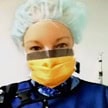-
Asked by 457hemb33 to Jonathan, Kellie, Kevin, Melissa, Stephanie on 27 Apr 2016.1
Question: What do you do when an exspirement goes wrong and you didnt get the results you wanted.
- Keywords:
-
Melissa Wilson Sayres answered on 27 Apr 2016:
To clarify – there is a huge difference between an experiment that goes wrong, and an experiment that gives me results that I wasn’t expecting (or didn’t want).
The first thing is to figure out which it is – and this also applies when an experiment gives us results we want – we need to be careful not to be very accepting of results we like, and only scrutinize results we don’t like.
So, regardless of the results, I work very hard to replicate all experiments and analyses. I also try to make sure that other people can replicate my work. This helps ensure that even if we’ve made a mistake, other people will be able to work through the experiment themselves and see if they get the same results.
If I’m convinced we did the experiment correctly, and the results are still not what I was expecting, then I think about the alternative explanations for the results, and talk with other people about how they would interpret the results. This is the great part of science!
-
Stephanie Moon answered on 27 Apr 2016:
Sometimes you have to try again, because they can be confusing to do right. If you made a small mistake it could give you a weird result. Other times if you get results that you didn’t expect you need to go back and think about your ideas again and try to figure out what’s actually happening.
-
Kellie Jaremko answered on 27 Apr 2016:
If you know that you made a mistake like spilling something during an experiment then the best thing to do is repeat it. In science it is key that conclusions from data are reproducible and not just found by chance. Most times you will plan to repeat the same experiment more than once and take the average answer to be closest to reality.
As Melissa and Stephanie said sometimes you get an answer that you don’t expect, even after repeating the experiment. In this case you need to think about what the data shows you. You may have discovered something equally as interesting, important, and exciting without even meaning to. The other thing to do is find a way to approach the problem from a different direction by designing a different type of experiment. Problem solving is a big part of science.
-
Jonathan Jackson answered on 27 Apr 2016:
Everyone has given really great answers already!
The thing to remember is that an experiment always gives us new information. Sometimes that information tells us that we made a careless, silly mistake, but it’s still something we didn’t know before! Scientists, no matter what kind of work we do, looooove learning things we didn’t know before. Personally, I learn the most when I discover that I’ve made a mistake. In fact, making mistakes has made it possible for me to do the kind of research that I’m doing!
As Melissa said, sometimes unexpected results are the very best thing that you can receive. One of the first experiments that I performed as a graduate student had very unusual results, which led to a whole new area of study. I believe these unusual results may tell us something new about how older adults think.
The one thing that often separates good scientists from the very best scientists is knowing whether weird results are due to a mistake, or to something really cool. Over the course of history, many really cool things (look up the discovery of penicillin here: http://www.pbs.org/newshour/rundown/the-real-story-behind-the-worlds-first-antibiotic/) could have been called “wrong,” but a scientist was brave enough to say: “Okay, I messed up, but isn’t this still kinda interesting?” That line of thinking does not always lead to great discoveries, but with enough careful thinking and hard work, we can all learn to learn something from every experiment we conduct.
-
Kevin Baker answered on 28 Apr 2016:
I like to revisit the question I am answering, then i go step by step through my experiment to see if anything went wrong. If all looks good, I will try one more time.






Comments